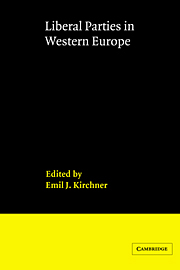Book contents
- Frontmatter
- Contents
- List of tables
- List of diagrams
- List of maps
- Notes on the contributors
- Preface
- 1 Introduction
- 2 Between left and right: the ambivalence of European liberalism
- 3 Two roads of Italian liberalism: the Partito Repubblicano Italiano (PRI) and the Partito Liberale Italiano (PLI)
- 4 The FDP in the Federal Republic of Germany: the requirements of survival and success
- 5 Great Britain — social liberalism reborn?
- 6 Liberalism in France
- 7 Liberal parties in the Netherlands
- 8 The Belgian liberal parties: economic radicals and social conservatives
- 9 The Freiheitliche Partei Österreichs: protest party or governing party?
- 10 The Swedish Liberal Party: The politics of unholy alliances
- 11 Liberalism in Denmark: agrarian, radical and still influential
- 12 The Norwegian Liberal Party: from political pioneer to political footnote
- 13 Liberal parties in Finland: from perennial coalition actors to an extra-parliamentary role
- 14 Liberal parties in Switzerland
- 15 The Luxemburg Liberal Party
- 16 Identifying liberal parties
- 17 Ambivalence revisited: an analysis of liberal party manifestos since 1945
- 18 Transnational links: the ELD and Liberal Party Group in the European Parliament
- 19 Western European liberal parties: developments since 1945 and prospects for the future
- Index of political parties
- General index
5 - Great Britain — social liberalism reborn?
Published online by Cambridge University Press: 16 November 2009
- Frontmatter
- Contents
- List of tables
- List of diagrams
- List of maps
- Notes on the contributors
- Preface
- 1 Introduction
- 2 Between left and right: the ambivalence of European liberalism
- 3 Two roads of Italian liberalism: the Partito Repubblicano Italiano (PRI) and the Partito Liberale Italiano (PLI)
- 4 The FDP in the Federal Republic of Germany: the requirements of survival and success
- 5 Great Britain — social liberalism reborn?
- 6 Liberalism in France
- 7 Liberal parties in the Netherlands
- 8 The Belgian liberal parties: economic radicals and social conservatives
- 9 The Freiheitliche Partei Österreichs: protest party or governing party?
- 10 The Swedish Liberal Party: The politics of unholy alliances
- 11 Liberalism in Denmark: agrarian, radical and still influential
- 12 The Norwegian Liberal Party: from political pioneer to political footnote
- 13 Liberal parties in Finland: from perennial coalition actors to an extra-parliamentary role
- 14 Liberal parties in Switzerland
- 15 The Luxemburg Liberal Party
- 16 Identifying liberal parties
- 17 Ambivalence revisited: an analysis of liberal party manifestos since 1945
- 18 Transnational links: the ELD and Liberal Party Group in the European Parliament
- 19 Western European liberal parties: developments since 1945 and prospects for the future
- Index of political parties
- General index
Summary
introduction
Organised liberalism has survived in Britain in the face of a number of formidable obstacles. Although once one of two great parties of state, the principal social cleavage it helped articulate, religion, has long since lost its electoral significance. After the First World War British politics came to be dominated by class, and in the process the Liberal Party not only lost electoral support but also split on more than one occasion and saw one wing of the party joining the Conservatives. Since 1945 none of its members has held ministerial office and by 1951 its electoral support had fallen to 2.5 per cent of the vote. These difficulties have been compounded by the operation of the singlemember plurality system which has ensured that its geographically evenly spread vote has never been able to secure more than a handful of seats.
Yet despite this unfavourable combination of circumstances, organised liberalism has not only survived but now flourishes. There is but one Liberal Party able to command a level of support which would in any other West European country accord it major party status. True, it has given up some of its independence by entering into an electoral alliance with the Social Democratic Party, formed in 1981 after a split within the Labour Party. But the formation of that party was encouraged by the leader of the Liberal Party himself as a means of pursuing the party's long-term strategy and now the SDP–Liberal Alliance is seen by some as the rekindling of a progressive ideological tradition which originated within the Liberal Party at the turn of the century.
- Type
- Chapter
- Information
- Liberal Parties in Western Europe , pp. 93 - 123Publisher: Cambridge University PressPrint publication year: 1988



